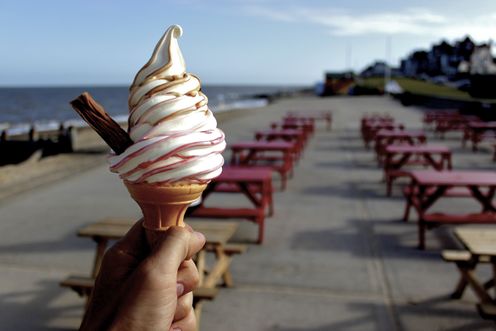
All over the world summer is synonymous with water activities, cold beverages and, of course, ice cream. While most of us agree ice cream and cold beverages are refreshing summer treats, do they actually help cool us down?
To test whether they do, we need to know a bit more about how the body controls temperature in different environments. The process of maintaining an optimal body temperature is called thermoregulation, which involves a delicate balance between producing and losing heat.
Humans are warm-blooded or endotherms, which are scientific ways of saying we can control our body temperature independent of the environment. We can do this because our bodies are constantly producing heat as a by-product of internal chemical processes (metabolism).
How it all works
Metabolism is necessary to keep our bodies functioning correctly. It includes digestive processes involved in breaking down nutrients in food, the absorption and transportation of those nutrients to the cells, and their conversion into building blocks or energy necessary for physical activity.
The heat this generates is beneficial when it’s cold, but when outside temperatures rise, we need to avoid overheating. While it may seem logical that introducing something cold, like ice cream, into the stomach should help reduce temperature, its initial cooling effect is rapidly replaced by heat generated by digestive processes needed to break down the nutrients in ice cream. Digesting calorie-rich food lead to an increase in body temperature.
So ice cream is not the best option for cooling down, but what about cold beverages? The heat transfer between a cold beverage and the digestive system can directly influence temperature. But, this is only momentary and depends on the quantity and caloric content of the ingested liquid.
A small amount of liquid will lose its cooling effect quite quickly as it get warmed up by the surrounding organs. And large amounts of cold liquids will cause blood flow to slow, making heat transport less effective.
As you can imagine, beverages with a high caloric content, such as soft drinks, will have a similar effect as ice cream and kick start our metabolism shortly after ingestion.
But I feel cooler…
The cooling effects of cold liquids are more likely explained by their rehydration effects. If heat does build up, the body will attempt to lose excess heat by transporting it away from the vital organs to the skin surface where it is transferred directly to our environment through convection and radiation.

For this to occur, the ambient temperature needs to be lower than our own temperature, or the opposite happens and heat will transfer into our body. Just like the heat radiated from the sun on a hot summer day.
Sweating is the most effective way our bodies lose heat. Sweating occurs when an increase in core body temperature is detected by the brain, which responds by stimulating the sweat glands distributed all over the body to produce sweat.
Sweat on the skin surface evaporates, causing the skin to cool down (also called evaporative cooling). Blood that’s flowing close to the surface of the skin gets cooled in the process and helps reduce core temperature.
On average, an adult can lose up to half or one litre of sweat every day, but in hot environments this can increase to almost a litre and a half an hour. That’s why it’s essential to keep the body hydrated during hot weather.
A different approach
What about alcoholic beverages? Many people reach for a cold beer on a hot summer day in an attempt to cool down. But alcohol is a diuretic, which means that it will make your body lose water and so reduce your ability to lose heat through sweating.
Surprisingly, warm beverages might be a good way to keep you cool. Although counter intuitive, drinking a warm beverage causes receptors in your mouth and throat to trigger a sweat response, allowing your body to cool down without having to ingest a large amount of the warm liquid.
Active ingredients in spicy foods have the same effect; they too trigger a sweat response that allows the body to cool down. That’s why these types of foods are popular in warm climates.
So while cold treats can be satisfying and are certainly refreshing, a better way of cooling down is to spice things up, get your sweat on and, most importantly, rehydrate!
Peter Poortvliet does not work for, consult to, own shares in or receive funding from any company or organisation that would benefit from this article, and has no relevant affiliations.
